The medieval law taking on Syria travellers
- Published
- comments
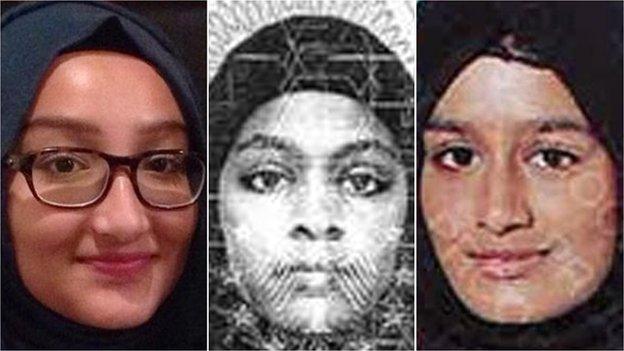
(From left) Kadiza Sultana, Amira Abase and Shamima Begum went missing in February from east London
If a family or teenagers want to go to Syria, should they be allowed to go? What about younger children? Over the last year, there have been a dozen cases where police and social services have sought court orders where there is evidence that children are either being taken towards the war zone - or trying to get there themselves.
Some 22 of these children has been made Wards of Court - a medieval law deployed to solve a very modern problem.
BBC research suggests there may have been more than 50 cases involving some kind of legal proceeding to protect children as the courts are increasingly being asked to intervene where police and others think children are being exposed to an extremist ideology.
The number of legal hearings deciding the future of children has increased for two reasons. Firstly, security chiefs have been long experimenting with legal tactics that will "disrupt" potential extremists.
Secondly, social services are now under a legal obligation to prevent extremism, and it appears they are actively looking for cases that cross the threshold for care proceedings.
The law stresses that taking a child out of the family home can only occur in strict and pretty exceptional circumstances. Having parents with strange views is not enough to break up a family.
As many judges have said down the years, they are not in the business of social engineering. Nevertheless, the state has long-standing legal obligations to protect children where they remain in the family home.

Protecting children: Cases where courts have intervened amid evidence of extremism
"Y": Teenage boy at risk of travelling to Syria to follow his brothers
"B": Teenage girl removed from family amid evidence they were radicalising her
"H, S, M and A": A group of girls from the same school in east London
"Z": Teenage girl who tried and failed to get to Syria
"Family X": Stopped from travelling in complex circumstances - judge later discharged wardship
"Family Y": Stopped by Turkish authorities close to Syrian border and returned to UK
"ZX": Father convicted of terrorism offences prevented from seeing children
BBC Research has identified further cases that cannot be reported for legal reasons

One of the most disturbing cases in the past year has been "Girl B".
The 16-year-old from Tower Hamlets in east London was described in court as a star student. But she was taken off a flight to Turkey minutes before take-off.
She, like a string of other teenage girls from the borough, appeared to have been "seduced" by the idea of becoming a "Jihadi bride", external, the judge said.
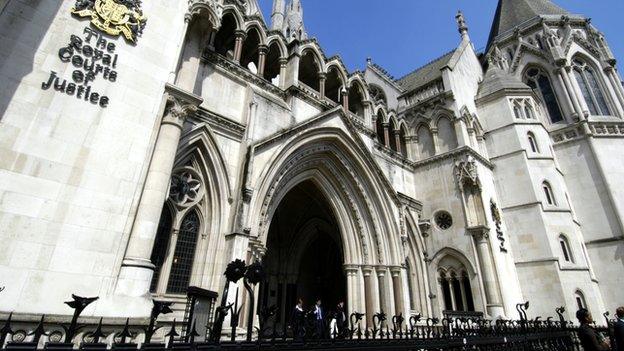
So Girl B was made a Ward of Court, one of the most powerful legal tools in Britain, joining others from the area who were separately subject to this control.
"It's a very old law dating back to the Middle Ages," says Professor Nigel Lowe of Cardiff University and an expert in how wardship is used.
"Its supreme advantage is that you can apply to make a child a ward of court instantaneously and that has the effect of stopping children leaving the jurisdiction, and places the children in the control of the court."
So in the Syrian cases, wardship has been used to stop children from travelling. Passports can be seized and families can be required to follow specific steps set out by a judge to ensure a child remains safe.
Crucially, says Professor Lowe, wardship is recognised and respected around the world - and that means foreign governments are more likely to help if the British authorities ask them to help bring someone home.
This is what happened in the publicly-reported case of a separate family from Berkshire during which the courts raced against the clock to secure them as they travelled across south-eastern Europe.

Tracking Britain's jihadists
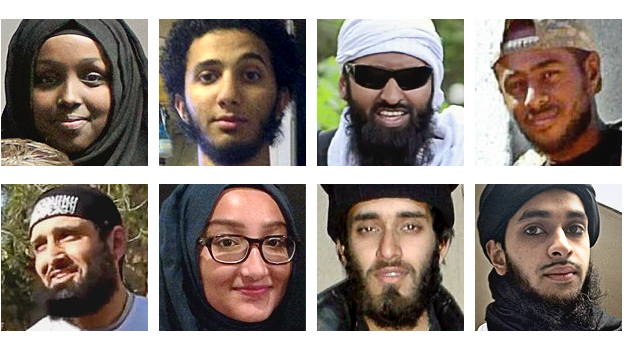
BBC News has compiled a database of people from the UK who have travelled to support or fight for jihadist organisations in Syria and Iraq. It includes the stories of:
More than 30 who are reported to have died
Those who have been convicted by the courts in England
Many others we have established to be alive and active in Syria or Iraq

After Girl B was made a ward, the family voluntarily handed over passports and appeared to co-operate. But a police search of their home found a vast amount of extremist material that indicated she had been radicalised by her own parents.
Mr Justice Hayden compared the case to sexual abuse. While the child's body had not been violated, her mind had been. He ordered Girl B to be removed from her family home.
The case of Family X shows how difficult some of these calls have become and how judges are now turning to a novel solution: tagging.
This extended family, including four children, were stopped at an airport as they tried to leave for Turkey. The children were warded to control their future movements - and a series of protracted court hearings examined conflicting evidence about their mother's intentions.
In a legal first, Sir James Munby, President of the Family Division of the High Court, proposed tagging the parents so their movements could be contained while the evidence of radicalisation was properly examined. This meant the children did not have to go into care.
The Ministry of Justice eventually agreed to the proposal after initially objecting on grounds of cost.
In his final judgement on the case just two weeks ago, the judge ruled that while the mother was a "proven liar", her motivations were incredibly complex and he was not convinced, on the evidence from the local authority, that she was an extremist out to radicalise her own children.
Defining radicalisation
Many of these developing cases on protecting children ultimately come down to a judgement on what radicalisation means and whether a parent's mindset could harm a child - and it isn't just those travelling to Syria who are being assessed.
In a judgement earlier in December, the High Court ruled that the Probation Service had the power to prevent terrorism offenders leaving prison from seeing their children, in case they were radicalised.
The claimant, known only as ZX, argued he had suffered a breach of his human rights when the body that oversees the management of offenders temporarily separated him from his family.
But Mr Justice Kerr said the state's responsibility to prevent radicalisation trumped the individual's right to see his children while experts assessed the risk they posed.
After three and a half months, ZX was allowed to see his children for five hours a day while those assessments continued.
And it looks like we'll get many more cases like his in the years to come.
- Published20 March 2015
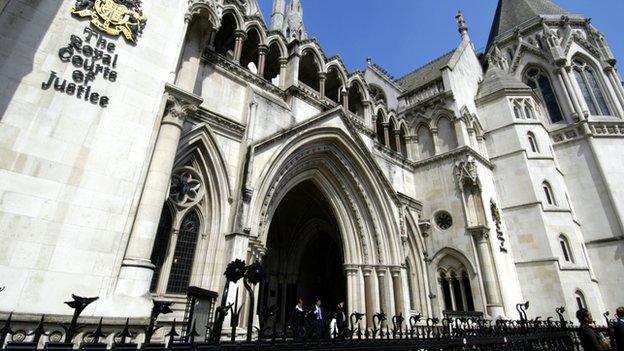
- Published27 March 2015
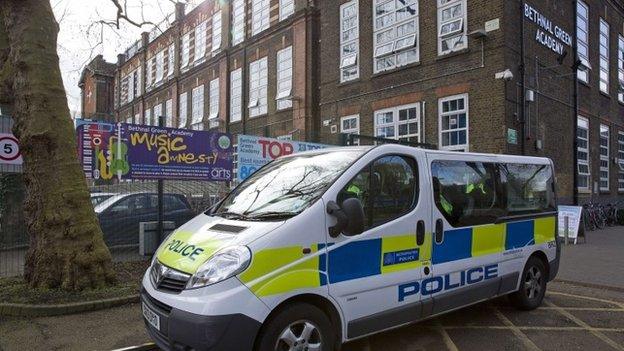
- Published20 May 2015